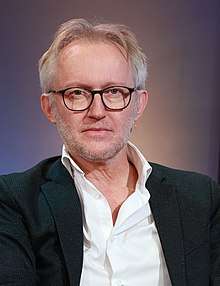David Van Reybrouck
David Van Reybrouck | |
|---|---|
 David Van Reybrouck. | |
| Born | 11 September 1971 |
| Occupation | Author |
David Grégoire Van Reybrouck (born 11 September 1971, in
Background and education
Van Reybrouck was born into a family of
Writings
Van Reybrouck's first book, De Plaag (in English: The Plague), was a cross between a travelogue and a literary whodunnit set in
His book Congo. Een geschiedenis (in English: Congo: The Epic History of a People) was published in 2010. It is based on his ten journeys through the Democratic Republic of the Congo and the use of libraries and archives. He has interviewed hundreds of individuals, with a particular predilection for so-called "ordinary people", precisely because their lives and choices are so often extraordinary[citation needed]. The book portrays slavery and colonialism, resistance and survival. It includes archival material, interviews and personal observations. Congo. Een geschiedenis has been translated into English, French, German, Italian, Norwegian, Polish, Swedish, Danish and Finnish. Van Reybrouck has also been actively involved in organising literary workshops for Congolese playwrights in Kinshasa and Goma.
In 2016 he published the English language version of Against Elections: The Case for Democracy where he advocates for a deliberative democracy based on sortition.[1]
In 2020 he published Revolusi which applies to Indonesia the method he used in Congo - a combination of interviews with Indonesian Nationalists and genocide perpetrators that live in complete impunity. It discusses the events that lead to start of Indonesia's military dictatorship, with historical interpretation.
In 2022 he published De kolonisatie van de toekomst (in English: The Colonization of the Future), where he argues that we should not only focus on the injustices of past colonialism, but also on today's injustices impacting present and future generations.[2]
Awards and honors

- 2004, Taalunie Toneelschrijfprijs
- 2007, Royal Academy of Dutch language and literature
- 2008, Ark Prize of the Free Word, Missie (play)
- 2010, AKO Literature Prize, Congo
- 2010, Libris History Prize (The Dutch, not the Canadian award), Congo
- 2012, Prix Médicis essai, Congo
- 2014, Gouden Ganzenveer[3]
- 2015, Doctor Honoris Causa of Saint-Louis University, Brussels[4]
- 2017, European Book Prize, fiction for Zink. Although a work of non-fiction, it won the fiction category.[5]
- 2018, European Press Prize, nominated for "Should media report differently in the wake of attacks? Think about it and join the discussion!"[6]
Publications (English)
- 2000, From Primitives to Primates. A history of ethnographic and primatological analogies in the study of prehistory. Leiden, Sidestone Press, 2012. (Dissertation ISBN 978-90-8890-095-2
- 2008, Missie (play)
- 2014, ISBN 9780062200112
- 2015, The First World War Now. ISBN 978-9492081070
- 2016, Against Elections: The Case for Democracy. ISBN 978-1847924223
- 2024, Revolusi: Indonesia and the Birth of the Modern World. ISBN 978-1324073697
Publications (Dutch)
- 2016, essay "Zink" about ISBN 9789059653597
- 2020, ISBN 9789403183404
- 2022, De kolonisatie van de toekomst. De Bezige Bij. ISBN 9789403183718
References
- ISSN 0261-3077. Retrieved 22 June 2023.
- ^ Chaumeau, Christine (20 December 2022). "David Van Reybrouck: "The fight for decolonization can't be detached from the fight against global warming"". JusticeInfo.net. Retrieved 22 June 2023.
- ^ Gouden Ganzenveer 2014
- ^ "Séance inaugurale de rentrée académique 2015–2016". Université Saint-Louis – Bruxelles.
- ^ "David Van Reybrouck wins the European Book Prize". Focus on Belgium. 14 December 2017. Retrieved 24 December 2017.
- ^ "Should media report differently in the wake of attacks? Think about it and join the discussion!".
This article is wholly or partly based on material from Dutch Wikipedia
External links
- David van Reybrouck's personal website
- David van Reybrouck's publisher's website Archived 1 December 2017 at the Wayback Machine
